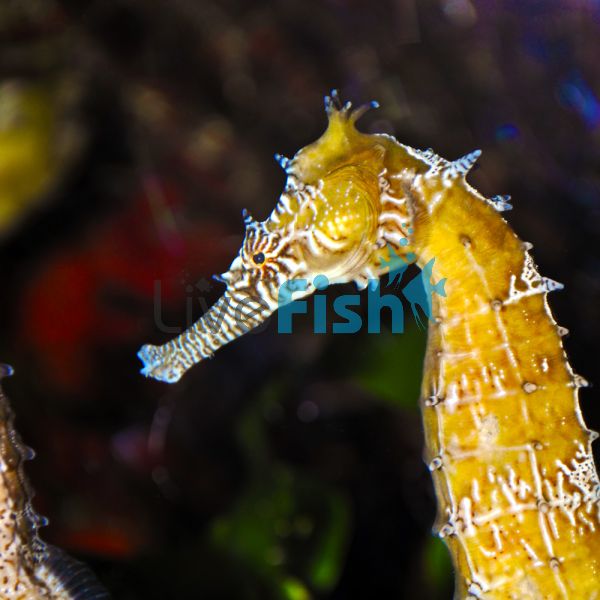Zebra Snouted Seahorse 7cm
This rare strikingly yellow species of seahorse is really exceptional addition to the right aquarium. With a long zebra-striped snout and well-defined spines, you'll find yourself watching these peaceful creatures for hours on end.
- Buy 2 for $144.08 each and save 10%
- Buy 4 for $128.07 each and save 20%
Zebra Snouted Seahorse
Most seahorses tend to change colour depending on their mood but Zebra Snouted seahorses remain a vibrant yellow colour most of the time. They have been known to vary from creamy-white to even orange. The distinctive horse-shaped snout is striped all the way to behind the eyes which is where this fish gets its name.
The males which are slightly larger can be differentiated from the females by the brood pouch on the front of their bodies. The females of this species will deposit their eggs in this pouch and the male will carry the eggs throughout the pregnancy.
The female provides daily greetings and encouragement to the male to strengthen the bond and the pair will remain monogamous throughout life and multiple pregnancies.
Seahorses are generally a little difficult to keep, but the effort is well worth it. They are constant feeders so will always be in a state of activity which makes for a very interesting aquarium.
The Zebra Snouted Seahorse can be found in South East Asia but mostly around Malaysia, The Philippines and Indonesia. They inhabit shallow water usually 10 metres or less but can even survive in estuaries. They seem to like seagrass beds, muddy swamps and other similar brackish water.
Tank Recommendations for Zebra Snouted Seahorse
The smallest tank size for this species of fish is 120 litres when kept as a single pair. An extra 40 litres should be added for each additional pair.
They like clinging on to stony corals so bear this in mind. Another important thing to remember is their swimming ability. They can handle some current but lack stamina so will need plenty of low flow areas which they can shelter and rest.
As these creatures are slow-moving and peaceful animals a species only tank is advisable.
Suitable Tank Buddies
This delicate but rewarding species of fish must be kept with other non-aggressive species that will not compete too much with it for food. Coral with stinging tentacles or ones that are big enough to eat the delicate seahorse should not be included to avoid harm.
Usually Compatible
These fish are best kept in pairs with other pairs of Seahorse species and Pipefish. Cardinals and Dragonetts generally make good tank buddies along with Gobies and small Hawkfish.
Sometime Compatible
Caution must be taken when housing seahorses with species such as Clownfish, Boxfish and Batfish due to their boisterous and semi-aggressive nature. Seahorses are easily bullied. Bigger crustaceans could also nip at the seahorses and small invertebrates will be eaten by them occasionally so watch out. Some species of live coral will damage the seahorses if they try to cling on, as well as the seahorse damaging certain delicate types of coral.
Rarely Compatible
Any species of a predator such as Groupers, Sharks, Anglerfish and Eels should definitely not be kept together. Seahorses are easy prey for these animals and won't last very long. This also includes Triggerfish, Snappers and Wrasses. Smaller aggressive fish such as Damsels, Parrotfish and Puffers are also detrimental to Seahorses due to over competing for food.
Feeding Your Zebra Snouted Seahorse
These seahorses are carnivores and in the wild feed on small crustaceans, shrimp and copepods and occasionally feast on the larvae of other fish. Captive-bred Zebra Snouted Seahorses will do well given a diet of frozen Mysis shrimp around 3 times a day. If added to the tank they will also feed upon small crustaceans often found in live rock.
It is extremely important to remove uneaten food daily.
| Scientific Name | Hippocampus Barbouri |
|---|---|
| Care Level | Hard |
| Common Names | The Zebra Snouted Seahorse is also known as Barbour's seahorse and the zebra seahorse |
| Diet | Carnivore |
| Fish Family | Syngnathidae |
| Lifespan (years) | 3 |
| Max. Length (cm) | 15 |
| Min. Tank Volume (l) | 120 |
| Origin | Indo-Pacific |
| Reef Safe | Yes |
| Sociability | Peaceful |
| Venomous | No |
| Water Conditions | 22-27° C, dKH 8-12, pH 8.0-8.3, sg 1.020-1.024 |




